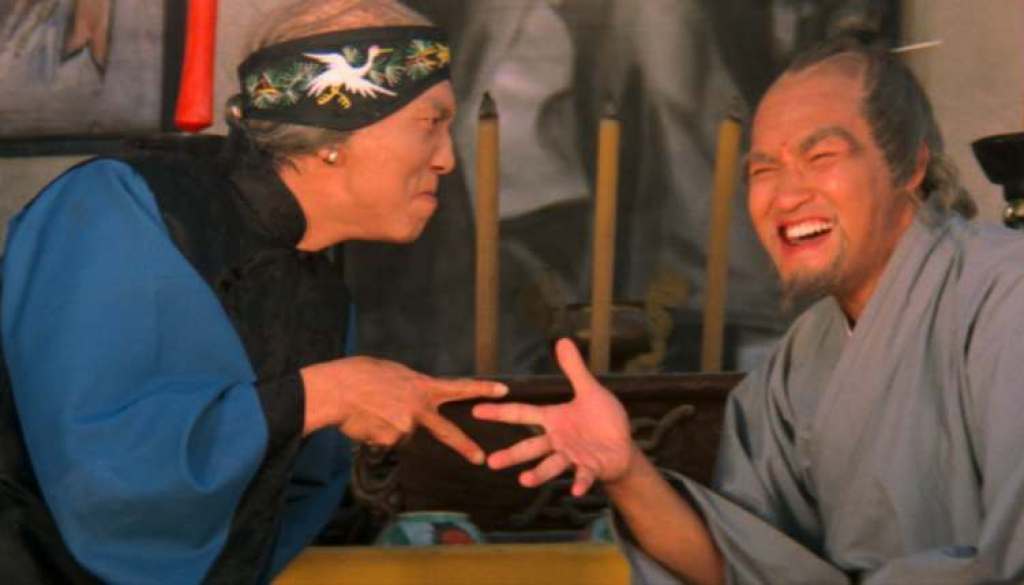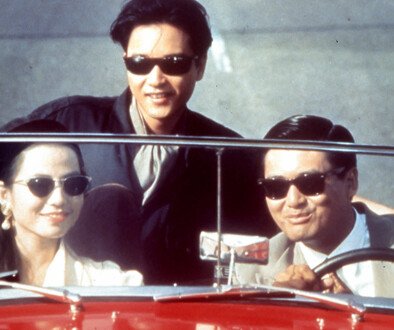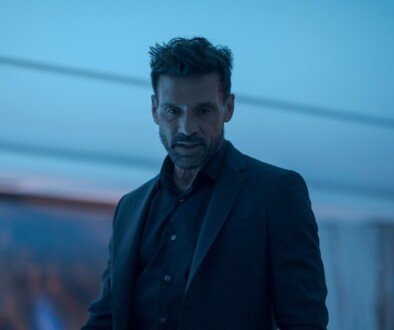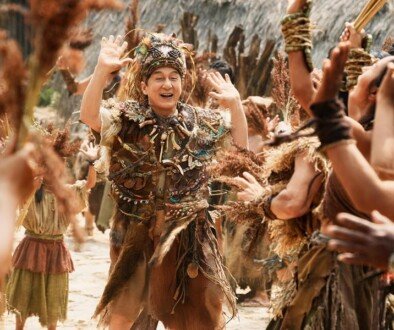MIRACLE FIGHTERS – Eureka Blu-Ray Review: A Miraculous Incarnation For Yuen Clan Fans

9 min. read
I haven’t seen Yuen Woo-Ping’s The Thousand Faces Of Dunjia since I reviewed it in 2017. Its production came on the basis of re-envisioning (or remaking depending on where you get your info) Yuen’s 1982 fantasy sorcery tale, Miracle Fighters, which itself is a celebrated classic. The latter is now available on Blu-Ray from Eureka Classics, and to be honest, returns under my radar as a film I haven’t seen until its release this summer on disc.
It is a welcome packaging too – a single disc with the movie presented in 1080p HD and restored in 2K, and loaded with a variety of features, including Original Cantonese mono audio and optional classic English dubbing. It also comes with two commentaries, one provided by film producer and curator Frank Djeng, and one from film experts Mike Leeder and Arne Venema. The disc also comes with an archival interview of Yuen by Frédéric Ambroisine, and a newly-produced documentary featurette hosted by John Kreng and directed by Michael Worth.
I will be sure to get into these features in this piece a little later on, but the film itself is an extrordinary watch for anyone keen on memorable kung fu cinema. Miracle Fighters is a Yuen Clan classic through and through in its framework, featuring an epic tale of murder, intrigue, supernatural mystery and vengeance. One of the first notable faces of the cast is Eddy Ko who plays Kao Hsiung, a 17th century Manchu soldier and core instructor of the Eight Banners Army, on trial for intermarriage with a Han woman at a time when marriages between the Manchu and Han were illegal. He is ordered to kill his Manchu lover, and upon refusing, is targeted for execution, resulting in the fatal kidnapping of a young prince, and the soldier’s subsequent exile.
Years later, Kao Hsiung is a downtrodden old drunkard, living in the care of Shu-gan (Yuen Yat-Chor), an aspiring martial artist whose own life is about to take a striking twist of fate when assassins learn that the former Manchu guard is still alive. A fight ensues and when Ko Hung is injured, Shu-gan sets out to find medicine, only to stumble upon the divided temple grounds of Older Brother (Bryan Leung), and Older Sister (Yuen Cheung-Yan), a pair of quibbling Taoist priests with a jocular rivalry that sets the stage for even more misadventures as Shu-gan prepares for his greatest battle yet.
I do want to point out how awesome it is that I now get to observe and review two Asian film classics this year featuring Ko, whose starring role in Heroes Shed No Tears can be read about here. Ko’s performance in Miracle Fighters is nothing short of stellar when it comes to observing Yuen’s action direction and all the feats and stunts performed, even with some undercranking involved in the editing process.

Actor Yuen Yat-Chor’s addition to the cast is equally inviting in his contribution to the story as it unfolds, particularly opposite Yuen Shun-Yi’s role as imperial enforcer, Sorceror Bat. Peppering the character line-up some is the role of a manchild in an urn, played by Brandy Yuen, who gets summoned by the Bat in a few scenes to do his bidding, namely killing anyone he demands. Interestingly enough, the manchild doesn’t kill anyone in the film, but his deceptively innocent face and jejune demeanor, make him an absolute menace when paired with his own sorcery skills and dexterity.
Bryan Leung and Yuen Cheung-Yan are a riot to see as the bickering Taoist sibs as they rival over who gets to train Shu-gan in their ways (something that ought to take you back down memory lane a bit with Sammo Hung and the late Lam Ching-ying in The Prodigal Son). Seeing as this was my first time with Miracle Fighters, I didn’t expect Yuen’s character to be female, so it was a nice little twist enjoy given Yuen’s knack for character-acting. I think perhaps though, this speaks to one other trait the film shares in its strengths pertaining to the action; I really enjoyed the practical effects used to convey both the mystique of the sorcery, and the more underhanded trickery strategically employed by our characters as the story progresses, especially in conjunction with the action performed by our cast, namely actors Yat-Chor and Shun-Yi.
That Miracle Fighters has its cast and crew paying homage to late screen legend and patriarch, Yuen Siu-Tien, in its own way is another satisfying feat to see in the few scenes his familiar likeness as “Sam Seed” is shown. It’s one highlight the aforementined Djeng iterates in his first of the two commentaries on the disc in addition to the various careers and screen credits of the cast involved, as well as a bit more on the literal meaning of the film’s non-English title with respect to Yuen’s 2017 successor. I also like that Djeng points out a bit of info on Brandy Yuen’s character in the film and the meaning behind his look, as well as some tidbits about portions of the music – particularly one portion of it used in a familiar Hollywood IP.
The second commentary by Leeder and Venema is a lot more stimulating for its fill of the film’s length. I was surprised to learn that the film was actually part of a larger trilogy, and folks are sure to get a kick out of the trivia shared about Leung and Ko and their work on The Man With The Iron Fists with star/director RZA, Miracle Fighters co-star Huang Ha who plays the deceptive rain ceremony mage Leung fights, and other factoids about the Yuen Clan and guesstimations on Yuen Yat-Chor’s expeditious departure from the industry after his final starring role in In The Line Of Duty IV with Cynthia Khan and Donnie Yen. There’s also some light shed on 1980 film, Thundering Mantis, and why fans shouldn’t expect it to see a release on Blu-Ray anytime soon, and the one movie Leeder refuses to call “Hard Boiled 2”.
One core fact about Yuen’s Miracle Fighters was that it was made at a time of transition for Golden Harvest and its rival, Shaw Brothers. This is an aspect that Yuen freely talks about in an archival interview shot by the aforementioned Ambroisine dubbed “Action Master” where he discusses the evolution of action choreography over the years and the changing of the times. He even goes into the impact legendary producer Ng See-Yuen had on his career, making Snake In The Eagle’s Shadow Yuen’s directorial debut, as well as thoughts on stars like Jackie Chan, Sammo Hung and Yuen Biao, as well as Donnie Yen and Michelle Yeoh, in addition to how he discovered Wu Jing, and how his 2010 Vincent Zhao starrer, True Legend, came to be.

Some more reflection on Yuen and his craft also comes by way in a new interview directed by Arnaud Lanaque in the disc feature, “At The Service Of The Great Magician,” with Miracle Fighters assistant director Fish Fong. He talks up a great deal from his time as a photojournalist for UPI and how he came to working for Yuen in the early 1980s. The longstanding Yuen clan cohort also shares old set stories regarding Yuen and his camraderie with his father and younger brothers on set, and he also dives a bit into an original concept for Miracle Fighters that was scrapped, and also why Yuen Cheung-Yan was cast for his role instead of a woman. Fong also details the late Yuen Siu-Tien’s influence in getting funding for the film, in addition to his eldest son’s approach to the action, the challenge of filming Brandy Yuen’s action, and the use of wires, the costly risks of a scene involving live snakes in a crater full of dry ice, and some of the pressures production faced by Golden Harvest before finishing.
The ceremony bookends with an interview with author, fight choreographer and film historian John Kreng in the segment, “The Shakespeare of Yuen Woo-Ping”. Kreng, who saw Miracle Fighters “countless times” growing up, details his time writing for a martial arts magazine and the moment he was requested exclusively by Yuen for what turned out to be an interview ten-times longer than expected due to the substance of Kreng’s questions. There are numerous references to Yuen’s career including from films like Snake In The Eagle Shadow and The Matrix, Kill Bill, and Miracle Fighters, while Kreng cites Yuen’s “manpower” and ingenuity in face of budgetary issues as a filmmaker. Furthermore, Kreng talks of consulting with Yuen about ideas for a modern remake of the film prior to its current iteration in The Thousand Faces Of Dunjia. He also discusses the kind of fat-free action cinema Yuen is capable of when he’s fully at the controls, describing his results as “tight as all hell”, and even throws in some surprising trivia about Yuen’s Hong Kong action classic starring Kenny Ho, Red Wolf, regarding its shooting duration, and the one 1997 Hollywood sequel that should have been its equal.
Topping it all off with a classic trailer and a 25-point photo gallery, Eureka Entertainment’s Miracle Fighters is a nifty celebration of a kung fu filmmaking family and legacy with a Yuen as its prime figurehead. Eureka continues to dole out the best in home entertainment here, and that its part of an actual trilogy of others lends a bit of hope that the boutique will craft the essentials needed to dole out those classics as part of its esteemed library. I had fun with this disc, and so here’s hoping that much like Miracle Fighters, Eureka has just as many – or more – tricks up its sleeve.
Native New Yorker. Been writing for a long time now, and I enjoy what I do. Be nice to me!






